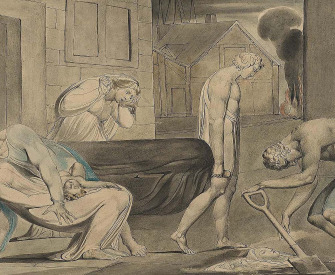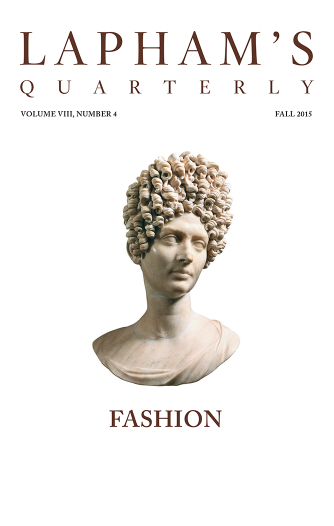The Athenians had sent their envoys to Delphi to ask an oracle how they would fare against the Persians, and as soon as the customary rites were performed and they had entered the shrine and taken their seats, the priestess Aristonice uttered the following prophecy:
Why sit you, doomed ones? Fly to the world’s end, leaving
Home and the heights your city circles like a wheel.
The head shall not remain in its place, nor the body,
Nor the feet beneath, nor the hands, nor the parts between;
But all is ruined, for fire and the headlong god of war
Speeding in a Syrian chariot shall bring you low.
Many a tower shall he destroy, not yours alone,
And give pitiless fire many shrines of gods,
Which even now stand sweating, with fear quivering,
While over the rooftops black blood runs streaming
In prophecy of woe that needs must come. But rise,
Haste from the sanctuary and bow your
hearts to grief.
The Athenian envoys heard these words with dismay; indeed, they were about to abandon themselves to despair at the dreadful fate which was prophesied, when Timon, the son of Androbulus and one of the most distinguished men in Delphi, suggested that they should take branches of olive in their hands and, in the guise of suppliants, approach the oracle a second time. The Athenians acted upon this suggestion. “Lord Apollo,” they said, “can you not, in consideration of these olive boughs which we have brought you, give us some better prophecy about our country? Otherwise we will never leave the holy place but stay here till we die.”
Thereupon the prophetess uttered a second prophecy, which ran as follows:
Not wholly can Pallas win the heart of Olympian Zeus,
Though she prays him with many prayers and all her subtlety;
Yet will I speak to you this other word, as firm as adamant:
Though all else shall be taken within the bound of Cecrops
And the fastness of the holy mountain of Cithaeron,
Yet Zeus the all-seeing grants to Athene’s prayer
That the wooden wall only shall not fall, but help you and your children.
But await not the host of horse and foot coming from Asia,
Nor be still, but turn your back and withdraw from the foe.
Truly a day will come when you will meet him face to face.
Divine Salamis, you will bring death to women’s sons
When the corn is scattered, or the harvest gathered in.
This second answer seemed to be, as indeed it was, less menacing than the first, so the envoys wrote it down and returned to Athens. When it was made public upon their arrival in the city and the attempt to explain it began, among the various opinions which were expressed, there were two mutually exclusive interpretations. Some of the older men supposed that the prophecy meant that the Acropolis would escape destruction, on the grounds that the Acropolis was fenced in the old days with a thorn hedge, and that this was the “wooden wall” of the oracle. But others thought that by this expression the oracle meant the ships, and they urged in consequence that everything should be abandoned in favour of the immediate preparation of a fleet. There was, however, for those who believed “wooden wall” to mean ships, one disturbing thing—namely, the last two lines of the Priestess’ prophecy: “Divine Salamis, you will bring death to women’s sons/When the corn is scattered, or the harvest gathered in.” This was a very awkward statement and caused profound disturbance among all who took the wooden wall to signify ships; for the professional interpreters understood the lines to mean that they would be beaten at Salamis in a fight at sea. There was, however, a man in Athens who had recently made a name for himself—Themistocles, called Neocles’ son; he now came forward and declared that there was an important point in which the professional interpreters were mistaken. If, he maintained, the disaster referred to was to strike the Athenians, it would not have been expressed in such mild language. “Hateful Salamis” would surely have been a more likely phrase than “divine Salamis,” if the inhabitants of the country were doomed to destruction there. On the contrary, the true interpretation was that the oracle referred not to the Athenians but to their enemies. The “wooden wall” did indeed mean the ships, so he advised his countrymen to prepare at once to meet the invader at sea.
The Athenians found Themistocles’ explanation of the oracle preferable to that of the professional interpreters, who had not only tried to dissuade them from preparing to fight at sea but had been against offering opposition of any sort. The only thing to do was, according to them, abandon Attica altogether and seek a home elsewhere.
Once on a previous occasion, Themistocles had succeeded in getting his views accepted, to the great benefit of his country. The Athenians had amassed a large sum of money from the produce of the mines at Laurium, which they proposed to share out among themselves at the rate of ten drachmas a man; Themistocles, however, persuaded them to give up this idea and, instead of distributing the money, to spend it on the construction of two hundred warships for use in the war with Aegina. The outbreak of this war at that moment saved Greece by forcing Athens to become a maritime power. In point of fact the two hundred ships were not employed for the purpose for which they were built, but were available for Greece in her hour of need. The Athenians also found it necessary to expand this existing fleet by laying down new ships, and they determined in debate after the discussion on the oracle, to take the god’s advice and meet the invader at sea with all the force they possessed, and with any other Greeks who were willing to join them.
© 1954 by the Estate of Aubrey de Sélincourt. Used with permission of Penguin Books Ltd.
From The Histories. Along with the two hundred triremes Themistocles had convinced Athens to build earlier, he was aided by around 150 more from various Greek city-states, most importantly Sparta. His interpretation of the oracle proved correct: the Battle of Salamis was decisive. The Greeks lost only about forty ships while they sank two hundred Persian vessels.
Back to Issue





